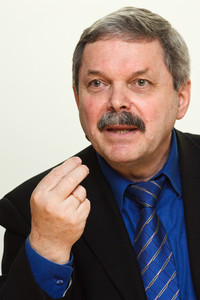Cuba Declaration by the Pope and the Moscow Patriarch - An epochal meeting with epochal consequences

Myroslav Marynovych
Vice-rector of Ukrainian Catholic University, former political prisoner
 The Declaration of the Pope of Rome and the Patriarch of Moscow signed at Havana, Cuba.
The Declaration of the Pope of Rome and the Patriarch of Moscow signed at Havana, Cuba.
Anyone who remembers my article “When diplomacy prevails over principles of faith,” will understand that the announcement of a meeting of Pope Francis with Kirill, Patriarch of Moscow, did not inspire me with any great hopes. Although, But I was also reluctant, before the meeting, to write articles counselling caution. Although Vatican diplomacy did not show any signs of improvement, this year, sometimes it is better to let the abscess be lanced as, this way, the disease manifests itself more clearly. Unfortunately, this is exactly what happened.
First, as for the the meeting itself. Several of Pope Francis’s predecessors longed for it. In particular, Pope John Paul II had insisted on it. However, the winning lot went to the pontiff who was the least prepared for it.
Pope Francis is a pastor of souls but he is not a politician, a fact which Moscow is well aware of. Of all the Popes, he is the least dangerous to them. Moreover, having been educated in Latin America, the current Pope does not understand the situation in Eastern Europe and has never entered into direct contact with the “secrets of the Kremlin’s court.”
The terrain,where the Pope feels most at home, and where he is capable of the greatest spiritual heights, is the human soul. Instead, world politics as it is quite evident by the Apostolic See’s actions, has been left to the mercy of Roman Curia’s politicians.
For a long time, the Moscow Patriarchate has skillfully used the special characteristics of the Vatican’s position, in consistently refusing to meeting with the popes in any environment unfavorable to Moscow. Always Catholics, of course, have been “guilty,” whether in alleged “Catholic proselytism in Russia,” or in the so-called “aggression of Greek Catholics over the Orthodox in Western Ukraine.”
Now, suddenly, all these arguments have vanished, obviously for the most respectable reasons: Moscow says that we must work together to protect the Christians of Syria (who, by the way, are being enthusiastically bombed by Russia), and protect human civilization from all sorts of perversions. In reality, the motivation is to save Russia from Putin's complete isolation and defeat.
I suppose that Vatican diplomats are celebrating a victory: decades of tremendous efforts have finally brought positive results - they finally managed to “coax Moscow into the dialogue.” “Finally” was the key word the Pope uttered, embracing the Patriarch.
However, to understand whose was really victorious, let us turn refer to the Declaration signed in Cuba.
Trusting and peace-loving souls will first of all focus on a number of paragraphs that, abstracting from the circumstances, could truly be called novel achievements of interchurch relations. For example, those who were worried about the silence of secular Europe about the Christians suffering from violence in the Middle East, will be happy to see that the same concerns expressed by signatories of the Declaration.
The people of liberal bias, for whom pluralism and tolerance are priorities, will be satisfied by paragraph 13, which says that "differences in understanding religious truths should not prevent people of different faiths to live in peace and harmony.” At the same time, people of anti-liberal bias will be satisfied with paragraphs 19–21, which emphasize traditional family values, the right to life, and warn of the dangers of aggressive secularism.
But for myself, for someone who have been educated in a system of cunning communist ideology, someone shocked by cynicism of the ideology of the Russian world, for me, not words but deeds are important. So when I read in paragraph 13 that “in the present circumstances religious leaders bear a special responsibility for the upbringing of their flock in respect of the beliefs of those who belong to other religious traditions,” I am immediately reminded that the Patriarch did not condemn, with a single word, the military aggression of his country against Ukraine, nor the religious persecution in the occupied territories. Simply, he has not fulfilled the very things he so eloquently calls for in the quoted paragraph.
That is why those points of the Declaration which primarily relate to the situation in Ukraine or which apply to it, are the test, for me, which should demonstrate the sincerity or insincerity of the Patriarch of Moscow and also the degree of awareness of the Catholic side.
Paragraph 26 can be called the “Balamand” clause. It repeats, almost word for word, the well-known formula of the famous Balamand agreement, namely, the distinction between
(A) “Uniatism” as a method of achieving unity of Churches and (B) Eastern Catholic Churches which, although having suffered as a result of the union, still have the right to exist.
But in the Cuba Declaration there is a small difference: it refers not to the “Eastern Catholic Churches,” but to the “ecclesial communities.” The difference is not perceptible to a secular eye, but it is a radical difference in church terminology ! And the Vatican is well aware of this difference when, for example, it distinguishes between the non-Catholic “Churches” and other “church communities.”
Therefore, here we cannot speak of a mere omission. The document clearly refers to the "communities" that “separated from their proper“Churches” as a result of the Union. Thus, this whole section was drafted, based on Orthodox ecclesiology in its Moscow interpretation.
Paragraph 26 is worth quoting in full (my translation): “We deplore the hostility in Ukraine that has already caused many victims, inflicted innumerable wounds on peaceful inhabitants and thrown society into a deep economic and humanitarian crisis. We invite all the parts involved in the conflict to prudence, to social solidarity and to action aimed at constructing peace. We invite our Churches in Ukraine to work towards social harmony, to refrain from taking part in the confrontation, and to not support any further development of the conflict.”
This paragraph was clearly written in the Kremlin. as, word-for-word, it repeats its propaganda rubber-stamp of a purely domestic nature “of the conflict in Ukraine.” It contains an indirect allusion to the claim that the Russian Orthodoxy is peaceful in the conflict zone, while “Uniates” and “schismatics” are fueling the conflict. In any case, this is how this paragraph will be used by Moscow in the near future.
Finally, in this section, there is no mention of Russia’s involvement in the conflict, a fact which is obvious to the whole world. It is clear that Metropolitan Hilarion Alfeyev proposed this paragraph. But it is most extraordinary that Vatican diplomats and even the Pope agreed to it. It is somewhat understandable that the nature of the "Ukrainian conflict" was still not understood in the summer of 2014, but such “naive ignorance” in early 2016 is obviously weighing on Vatican’s conscience.
In Paragraph 27 of the Declaration, the signatories have expressed a “hope that the schism among Orthodox believers in Ukraine will be overcome, based on the existing canonical norms.” Indeed, this is the old Vatican policy of maintaining contact only with the “canonical” Orthodox Church in Ukraine.
It is not difficult to imagine how negatively this paragraph will be perceived in the Ukrainian Orthodox Churches that are not in communion with the Moscow Patriarchate. One can only deplore once again that the canonical principle becomes absolute in the Vatican’s ideology – regardless of whatever distortion of truth and justice it brings.
Not annoying Moscow is the starting point for any of the Vatican’s steps in relations with other churches.
This might be grounds for Ukrainian Christians be get offended, if it was not for the fact that, fortunately, the Gospel says nothing about canonical status, but does say a lot about the Truth and the diligence that Christians are to show in the face of Evil.
The impressions of wickedness only increases when you read paragraph 28, which contains many good and correct words about the need for cooperation between Catholics and Orthodox, and the Gospel as the basis of this joint action. But once we come across the words on the need for “common witness of the moral dignity and true freedom of man,” massive violations of religious human rights in the territories occupied by Russia come in mind, areas which have now become the preserve “Russkiy mir” (The Russian World).
We are dealing with the persecution of the Ukrainian Orthodox Church and the Ukrainian Greek Catholic Church in Crimea and in eastern Ukraine, physical violence towards Protestant pastors, arbitrary arrests and "disappearances" of Crimean Tatar activists, and so on. This Declaration does not contain a single word about them, as if the pain fo “non-canonical believers” and “infidels” is less worthy of compassion than the pain of Christians in Syria.
In fact, the past, the Popes have repeatedly used the meetings with political or religious leaders to defend religious freedom and human rights. It is enough it to remember the release from Siberian prison of Patriarch Joseph Slipyi, because of Saint John XXIII’s intervention, or the legalization of the UGCC, due to Saint John Paul II.
That is why it was impossible to condemn the planned meeting of Pope Francis and Patriarch Kirill before it took place, because the pope had the opportunity to defend the interests of those downtrodden by Russian aggression. He could have used the opportunity, but did not.
The Cuba Declaration of the two Primates was designed in such a way to refer to Russia as the land of “unprecedented revival of the Christian faith,” where one can “freely practice their faith,” whereas anxiety is expressed only when it comes to other countries, where “Christians are faced with the restriction of religious freedom and the right to witness their beliefs and live up to them.”
That is why I have come to a painful conclusion: in the matter of Ukraine and Russia, the Catholic Church has once passed over the truth for the sake of an ephemeral “dialogue with Russia.”
The Cuba Declaration of the Pope and the Patriarch of Moscow is a vivid illustration of several things: the inevitable victory of the FSB [KGB] and the Kremlin, with all their obedient servants, to which I also refer the ROC; the complete defeat of the Ukrainian public diplomacy in the Vatican and the apparent failure of the UGCC information service there; incurable blindness and incompetence of the Vatican’s diplomacy, which can be easily deceived by means of peaceful vocabulary; and impending failure of the influential circles of Europe to decode deceitful formulas of Putin’s propaganda.
Therefore, the meeting of the Pope and the Patriarch of Moscow has truly become a landmark. But the failure of the Vatican diplomats, who cannot look out into the real world from behind their pile of well-worn textbooks of Оstpolitik, is also of historical importance.









